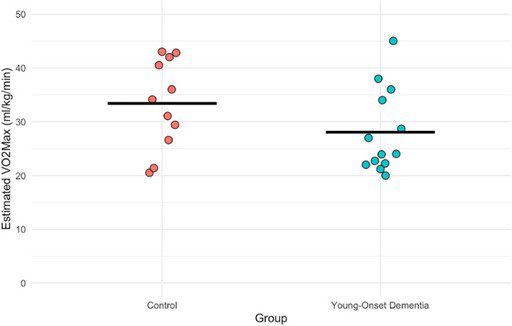Research and evidence
A collection of research focusing on the most prominent subjects relating to young onset dementia, gathered by members of the Young Dementia Network Steering Group and other experienced researchers.
By Dr Laurence Hayes and Dr Ethan Berry
Young onset dementia represents around 5% of all dementia cases in the UK, and physical activity/exercise guidance for these individuals is lacking, due to the lack of understanding research in this group. Exercise has been proposed as a non-pharmacological treatment to slow the progression of dementia and combat the ageing effects we all face. However, for this to be prescribed with confidence we need look at people with young onset dementia specifically and identify how much, if at all, they differ to a healthy age-matched controls.
What did we measure?
To examine this, we studied 17 control people and 16 people with young onset dementia to assess differences between the groups. Body composition, blood pressure, physical fitness, grip strength, lung function, physical activity (or lack of), and ultrasound scans of muscle and blood vessels were measured. It was predicted that the people living with young onset dementia would have worse scores compared to the control group for all parameters.
What did we find?
Surprisingly, results showed otherwise, with no differences between the two groups for body composition, blood pressure, physical fitness, grip strength, lung function, and ultrasound scans of blood vessels.
The group of people with young onset dementia had poorer physical fitness (although we need more data), physical activity, physical inactivity, and some measures of muscle ultrasound.


Caveats
There were quite large (technically speaking, these were ‘moderate’) differences in some parameters (eg physical fitness and blood vessel function; see below) but the variation in values was greater than we expected, which means we did not have enough people to detect a ‘statistically significant’ difference.
Conclusions
Moving forward, researchers can be aware of the variation in data to expect in this cohort, so can recruit participants accordingly. We can say, with confidence however, that people with young onset dementia were less active than controls. Health care professionals should therefore encourage moderate to vigorous physical activity and breaking up sedentary time for people with young onset dementia to improve physical fitness, muscle structure, and potentially quality of life (stay tuned; data coming soon!). This will reduce risk of comorbidities like obesity, type 2 diabetes, and many more.
We can now look at ways of prescribing exercise to accommodate the requirements of younger people with dementia. This could include co-production or co-design, the recommendation of more high intensity short duration movement so that fatigue can be managed more easily, and rest periods are more frequent. It was also previously noted that on average people with young onset dementia are receiving less moderate to high intensity exercise which effects overall health and aerobic functioning.
Most concerningly from this study, we recorded higher levels of sedentariness, which can have wider effects on lifestyle causing fragility through loss of bone health and muscle strength. This is why it would also be important to see an incorporation of conditioning-based exercises along with aerobic training, to ensure their bodies’ strength is maintained to avoid falls and immobility.
Hopefully we can continue this work looking at how we support people with young onset dementia get, or remain, active to maintain or improve physical, mental, and social wellbeing.
Dr Lawrence Hayes’ recent research has focused on people living with chronic conditions and how those conditions can be monitored and improved, often using an mHealth approach. Primarily, he is interested in how exercise influences health and has interests in endocrinology, exercise biochemistry, high intensity interval training (HIIT), meta-science, and nutrition. Currently, at Lancaster University Medical School, Dr Hayes serves as a Research Support Service advisor leading multiple funding applications. He has authored around 100 peer-reviewed publications and serve as an Associate Editor for several journals.
Dr Ethan Berry is a research assistant at the Sport and Physical Research Institute, School of Health and Life Sciences at the University of West of Scotland. Following his undergraduate degree in sport and exercise science, he then went on to complete a Master of Research degree specialising in profiling young onset dementia for targeted exercise interventions. Currently, Ethan is carrying out a PhD aiming to develop a mHealth intervention which targets muscle strengthening in older adults. Ethan’s research interests span across exercise physiology, ageing, young onset dementia, long Covid and ME/CFS. Ethan has co-authored six scientific publications and has worked as a reviewer for The American Journal of Medicine.
January 2025
A collection of research focusing on the most prominent subjects relating to young onset dementia, gathered by members of the Young Dementia Network Steering Group and other experienced researchers.
An introductory guide to help you find and understand research on young onset dementia.
Do you know of a young onset dementia research study for inclusion in our collection?